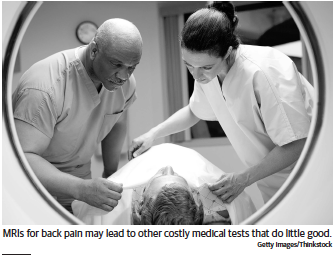Star-Telegram — Medical Tests You Don’t Need
Testing Limits
Choosing Wisely’s campaign highlights some
screening exams that may be unnecessary
Recently, a beloved relative of mine, a spirited healthcare aversive octogenarian, met with a doctor who suggested that, at his advanced age, he ought to consider having a bone density scan performed on his body.
“Why would I need that?” he demanded. “It will tell us whether or not you have brittle bones,” his physician answered. “Then we’ll know if you’re at risk of breaking something if you fall.”
 He hesitated for at least three seconds before delivering his tart response: “I’m 89 years old. Of course I have brittle bones. I don’t need a bone density scan to tell me that.”
He hesitated for at least three seconds before delivering his tart response: “I’m 89 years old. Of course I have brittle bones. I don’t need a bone density scan to tell me that.”
My mind kept returning to this little scenario while I reviewed the latest news from the American Board of Internal Medicine (ABIM) Foundation and its Choosing Wisely campaign.
Launched in 2011 and partnering with organizations like Consumer Reports and AARP, the campaign claims that common screening tests are performed on too many people and often produce false positive results, which may lead to “unneeded invasive procedures, medications and even surgeries.”
Among the tests identified by Choosing Wisely as overused are annual Pap smears, routine EKGs and stress tests, colonoscopies past age 75, regular PSA tests for detecting prostate cancer and the PET scan for diagnosing Alzheimer’s.
“It’s still a profound problem,” said Karen Batory, vice president of public health and medical education for the Texas Medical Association, which has firmly jumped on the Choosing Wisely bandwagon and accepted a $50,000 grant from the ABIM Foundation “to spread the message and get conversations started.”
* * * * * * *
Do you need that test?
According to the ABIM Foundation’s Choosing Wisely campaign and about 50 affiliated medical groups that have partnered with or aligned their efforts with it, medical tests such as MRIs and CT scans are routinely and unnecessarily prescribed — doing more harm than good and wasting billions of healthcare dollars.
A 2011 study estimated that 12 commonly overused tests cost consumers $6.8 billion in a year’s time, and according to a report in Scientific American, researchers at the National Cancer Institute estimated that 29,000 future cancer cases could be attributed to the 72 million CT scans performed nationwide in 2007. Experts say there are a lot of conversations that prospective patients and their doctors should be having before testing and treatment are pursued.
* * * * * * *
Batory calls Choosing Wisely “an innovative program that’s physician-led and evidence based,” and says the Tarrant County Medical Board and Dallas County Medical Board are among those participating in North Texas.
Just to be clear: This isn’t a case of watchdog groups accusing doctors of over testing unwilling patients or mindlessly pursuing inappropriate interventions. The message is that sometimes patients request tests and treatments that aren’t medically necessary and may not be in their best interests, and that physicians, trying to cover all possible bases, may struggle with decisions about which tests and procedures to prescribe.
In addition, sometimes people consult multiple doctors about different health concerns, and Batory says “coordination of care” can be an issue when different doctors prescribe drugs for different conditions that might counteract one another.
With the help of groups like the TMA, the Choosing Wisely campaign is continuing efforts on a national level to educate physicians and the general public about the more-harm-than-good aspects of commonly overused interventions.
“It started with about nine specialty medical groups being involved, and now there are about 50,” Batory noted. “These doctors had to get together and discuss what tests were necessary, and which weren’t, and come to a consensus. That’s an extremely important dialogue.”
Some specifics:
Nuclear stress tests and imaging tests following heart procedures
Heart patients often seek reassurances following bypass surgeries and other procedures, but the Choosing Wisely campaign notes that running these tests annually or every couple of years without new symptoms rarely results in treatment changes, and officials with the American College of Cardiology say more testing frequently leads to invasive procedures and excess radiation without improving an individual’s health.
Annual electrocardio- grams and exercise stress tests
A recent survey of 1,200 people between the ages of 40 and 60 who had never had any symptoms of heart disease found that almost 40 percent had nonetheless had EKGs in the past five years and 12 percent had a stress test. According to Consumer Reports, however, someone who has a low risk of heart disease is 10 times more likely to get a false-positive result from an exercise stress test than have a true problem, and this can lead to heart catheterizations and stents.
X-rays, CT scans and MRIs for lower back pain
Back pain is so common that an estimated 80 percent of people will experience it during their lives, and we’re talking about the excruciating variety rather than the occasional muscle tweak. While most back pain diminishes within a month, MRI imaging tests often lead to other expensive procedures that may not improve the condition or speed recovery, and the AARP reports that people who had an MRI during the first month of back pain were eight times more likely to proceed to a surgical remedy than those who didn’t, but there wasn’t a correlating speed in relief rates.
The PSA test for prostate cancer
The main issue with this routine screening appears to be its overuse. Estimating that 75 percent of tests showing high PSA levels in men — a marker for prostate cancer — turn out to be false positives, the American Academy of Family Physicians has come out with a recommendation against routine PSA screenings.
The American Urological Association still supports the test but says it should be focused on men between the ages of 55 and 69.
Bone density scans for women younger than 65 (and men under 70)
For people over age 50 who have mild bone loss, called osteopenia, the expense for repeated bone density testing adds up, and Consumer Reports notes that evidence of benefits from the commonly prescribed drugs is scant. In fact, side effects from the major ones — Fosamax (alendronate) and Boniva (ibandronate) — include heartburn and muscle pain, throat and chest pain, bone loss in the jaw and thigh bone fractures.
For more information about Choosing Wisely, visit Consumerhealthchoices.org, or check out the Texas Medical Association’s Choosing Wisely page at www.texmed.org/choosingwisely/.
